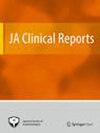老年患者非心脏手术后围术期使用非甾体抗炎药与心血管并发症之间的关系
IF 1
Q3 ANESTHESIOLOGY
引用次数: 0
摘要
我们研究了老年非心脏手术患者围手术期服用非甾体抗炎药(NSAIDs)是否与术后心血管并发症发生率增加有关。我们从华盛顿大学医学中心获得的美国外科学院-国家外科质量改进计划登记数据中回顾性地提取了年龄≥ 65 岁、住院非心脏手术时间≥ 1 小时的患者信息。我们比较了围手术期服用非甾体抗炎药和未服用非甾体抗炎药的患者在以下两个方面的综合结果:(1) 术后 30 天内心血管并发症的发生率;(2) 术后胃肠道和肾脏并发症的发生率以及术后住院时间。我们分别使用多变量逻辑回归模型来分析这两种综合结果,并使用泊松回归模型来分析住院时间。围手术期服用非甾体抗炎药与术后心血管并发症(估计比值比 (OR),1.78;95% 置信区间 (CI),0.97-3.25;P = 0.06)、合并肾脏和胃肠道并发症(估计 OR,1.30;95% CI,0.53 至 3.20;P = 0.57)以及术后住院天数(发病率比,1.06;95% CI,0.93 至 1.21;P = 0.39)。在老年非心脏手术患者中,围手术期服用非甾体抗炎药与术后心血管并发症、术后30天内肾脏和胃肠道并发症发生率的增加以及术后住院时间的延长无关。本文章由计算机程序翻译,如有差异,请以英文原文为准。
Association between perioperative non-steroidal anti-inflammatory drug use and cardiovascular complications after non-cardiac surgery in older adult patients
We investigated in older adult non-cardiac surgical patients whether receipt of perioperative non-steroidal anti-inflammatory drugs (NSAIDs) is associated with increased incidence of postoperative cardiovascular complications. We retrospectively extracted the information for patients with age ≥ 65 years who had inpatient non-cardiac surgery with a duration of ≥ 1 h from the American College of Surgeons-National Surgical Quality Improvement Program registry data acquired at the University of Washington Medical Center. We compared patients who received NSAIDs perioperatively to those who did not receive NSAIDs, on the two composite outcomes: (1) the incidence of postoperative cardiovascular complications within 30 days of the surgery, and (2) the incidence of combined postoperative gastrointestinal and renal complications, and length of postoperative hospital stay. We used separate multivariable logistic regression models to analyze the two composite outcomes and a Poisson regression model for the length of hospital stay. The receipt of perioperative NSAIDs was not associated with postoperative cardiovascular complications (estimated odds ratio (OR), 1.78; 95% confidence interval (CI), 0.97 to 3.25; P = 0.06), combined renal and gastrointestinal complications (estimated OR, 1.30; 95% CI, 0.53 to 3.20; P = 0.57), and length of postoperative hospital stay in days (incidence rate ratio, 1.06; 95% CI, 0.93 to 1.21; P = 0.39). In older adult non-cardiac surgical patients, receipt of perioperative NSAIDs was not associated with increased incidences of postoperative cardiovascular complications, and renal and gastrointestinal complications within 30 days after surgery, or length of postoperative hospital stay.
求助全文
通过发布文献求助,成功后即可免费获取论文全文。
去求助
来源期刊

JA Clinical Reports
ANESTHESIOLOGY-
CiteScore
1.30
自引率
0.00%
发文量
90
审稿时长
9 weeks
期刊介绍:
JA Clinical Reports is a companion journal to the Journal of Anesthesia (JA), the official journal of the Japanese Society of Anesthesiologists (JSA). This journal is an open access, peer-reviewed, online journal related to clinical anesthesia practices such as anesthesia management, pain management and intensive care. Case reports are very important articles from the viewpoint of education and the cultivation of scientific thinking in the field of anesthesia. However, submissions of anesthesia research and clinical reports from Japan are notably decreasing in major anesthesia journals. Therefore, the JSA has decided to launch a new journal, JA Clinical Reports, to encourage JSA members, particularly junior Japanese anesthesiologists, to publish papers in English language.
 求助内容:
求助内容: 应助结果提醒方式:
应助结果提醒方式:


